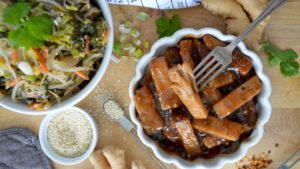It’s World Vegan Day soon. Some of us are entering November with renewed ambition to commit to plant-based diets. With plant-based food sales over the last year rising by 28% in Europe, 27% in the US, and the Asian market being projected to hit $65 billion by 2030, we’re not alone. With the climate crisis looming over, the pressure to find diets that save the planet is running high. Can going plant-based really help?
Amidst this surging demand from all over the world, supermarkets are expanding their vegan portfolios. This is good news for the planet, right? According to the most comprehensive analysis to date of the damage of farming to the planet, scientists found that avoiding meat and dairy products is the “single biggest way to reduce your environmental impact on the planet”. This is because without this consumption, we could cut global farmland use by over 75%. And we could still feed the world.
That said, there are variations in the literature. The Guardian reports that while some studies show choosing vegetarian reduces emissions only by 3%, others say it could go up to 20-30% if you halve your meat consumption. These variations come down to the metrics and measurements of sustainability researchers use. When it comes to saving the planet, it’s not just about emissions. It’s also about impacts on soil, water, ecosystem services, and more. Not to mention, it could also be about the carbon opportunity cost of farming an animal-based versus plant-based product.
With so many variations, we decided to enlist the help of some experts. Vikas Garg, who’s a familiar face at Green Is The New Black, is the founder of abillion, a social app that is a driver of positive change in food, beauty and fashion. The app’s vision is a world with at least a billion people committed to plant-based living by the year 2030. We also spoke to Peter Hammarstedt, Director of Ship Operations at Sea Shepherd Global. Hammarstedt has sailed the seven seas over the past fourteen years, using direct intervention to save lives from illegal whaling, sealing and destructive fishing practices. Finally, we chatted with Ocean Robbins, author, speaker, and expert on all things food revolution.
Here’s what they said…
How has the plant-based space grown over the past year?
VG: It’s growing! People around the world, from Indonesia to Chile are digging into more natural, healthier foods and choosing fruits, veggies and their preferred dose of plork, chick’n, veef (we need a better word…), and moo-free milk! I just saw a coffee shop where oat milk is free and cow milk is extra!
PH: I became vegan almost twenty years ago, when I had to drive for half an hour to pick up a quart of powdered soy milk. I’m astounded by the options of plant-based milks now. Plant-based options for so-called seafood, however, have seen much slower growth until quite recently. But thankfully, companies like Good Catch and Vegan SeaStar are now revolutionising the space. So now vegans have sushi options that go beyond avocado maki.
OR: In the last year, the plant-based space has continued to grow rapidly. Major food brands and retailers are now considering plant-based meats, milks, cheeses, etc. to be a central (and rapidly growing) part of each food category. While a lot of the growth in plant-based foods is coming from so-called “alternatives”, which are better for the environment and for animals, but may or may not be healthier than their meat and dairy-based competitors, a growing cross-section of plant-based eaters are also moving in this direction for health reasons. These consumers are growing the market for fresh fruits and vegetables, whole grains, and legumes—thus increasing the amount of fibre, vitamins, minerals, flavonoids and other phyonutrients that are beneficial to their health.
What can we do to reduce our environmental impact?
VG: Look no further than what’s on your plate. Making better food choices is the biggest thing every one of us can do to make an impact on the planet. Collectively, changing what we eat can tackle every sustainability development goal. From ending food inequities and world hunger, to putting an end to cutting down our rainforests and ensuring that we have the land, water and climate for living organisms to thrive.
PH: We need a change in philosophy. The greatest lie ever told was that humans are separate from the natural world, as opposed to being an inextricable part of it. We have to transition away from solely ascribing a utility value to nature. Instead, we should recognise that animals and plants have an intrinsic value. But it’s not enough to just change our way of thinking. We have to take action. In developed countries where it is economically possible for the majority of people to transition to a plant-based diet, it’s my opinion that individuals should take that step.
But we can’t expect the plight of animals to end just because we remove ourselves from the animal food web. Compassionate and passionate people need to directly intervene to stop animal suffering and that requires advocacy. Activism can take many forms. What is important is that it takes a form that is sustainable, meaning that it fits with existing passions that a person already has, allowing the activism to be a lifelong pursuit. At the end of the day, we need a broad movement to save the oceans and that requires lawyers, doctors, media professionals, fitness experts, dieticians and yes, even mariners like myself!

IMAGE: Nadine Primeau via Unsplash | IMAGE DESCRIPTION: A spread on a wooden table. On the top left is what appears to be a salad in a white round bowl, with carrots, beansprouts, broccoli, and parsley on top. Next to it is another white bowl, with curved edges. In it appears to be marinated jackfruit. There is a fork poking one piece of jackfruit, which are cut into strips that resemble meat. On the table are ingredients, including short-grain rice, ginger, pepper flakes, parsley and spring onions.
OR: Every bite you take, and every food dollar you spend, is a vote. You’re voting for the health you want, and for the world you want. When you choose more plant-based foods, you contribute to greater health for you. And to a world with more rainforests, more topsoil, more water, and more hope for future generations. When you choose more local food, you bring yourself healthier and fresher food. And you contribute to a world in which farmers are paid enough to feed their families, money stays in communities, and less greenhouse gas emissions go to transporting food around the world. When you buy fair trade certified food, you contribute to a more ethical food system. For all of us.
All of this matters. It matters to your health. It matters to your sense of dignity and self-respect. (It’s amazing how good it feels to be on the right side of history!) And of course, it matters to the future of our world.
What about systems change?
VG: Don’t rely on governments and institutions. It’s a huge waste of time. Change your life, inspire others to change, and eventually, governments and institutions will follow. Or just vote them out!
PH: The anthropologist Margaret Mead pointed out that throughout history, small groups of individuals have always been the end of the spear that brings about social change. Governments watch social movements closely, and jump on board to take credit when a critical mass has been reached. As the abolitionist Fredrick Douglas wrote, “power cedes nothing without a demand. It never did and it never will.” We have to demand accountability from governments, corporations and other institutions.
And we humans are social animals who, throughout history, have looked to our storytellers to make sense of the world. Therefore, we need to come up with creative and innovative ways to tell the story of what’s happening to animals. Those stories take animal suffering from the abstract to the tangible, allowing people to empathise. That in turn can bring about systemic change. In short, we have to be exemplary strategic storytellers who recognise that change begins with us.

IMAGE: Hayleigh Sawdaye via Unsplash | IMAGE DESCRIPTION: A photo of a yellow wall, with graffiti on it. The text, in slanted black font, reads: “IF YOU’RE READING THIS IT’S TIME FOR CHANGE.”
OR: You can create change on three levels at once. Personally, through your own food choices: you can eat less sugar, processed foods, and meat, dairy and eggs. You can move towards eating more whole plant foods. Interpersonally, you can spread the word to friends and loved ones. You can share delicious, healthy and sustainable meals (and recipes) with friends and family, and build bonds and social ties with others who support your food values.
And systemically, you can speak up or advocate for healthy lunches in your local schools, plant-based options in your workplace and in your favourite restaurants, and bringing more farmer’s markets into more communities. You can write letters to your political representatives, urging them to support small-scale family farmers (especially fruit and vegetable farmers), to cease harmful government subsidy of commodities crops that bring down the price of factory-farmed meat and of junk foods, and to support food aid programmes that make healthy food more accessible and affordable to low-income communities.
Ready to be part of the plant-based revolution?
If you’re curious to learn more about the plant-based revolution, these three experts will be giving talks at the upcoming Plant-Based Asia Summit, from 1–4 November. The Plant-Based Asia Summit is a free online event, inspiring a healthier and more sustainable Asia Pacific. Showcasing talks and presentations with 30 experts and industry leaders in health, fitness, sustainability, and food tech from Asia and Pacific and beyond, you will learn leading-edge information to help you reach your health and sustainability goals. To promote good health and movement, there will also be special sessions, from cooking workshops to fitness classes! Book your place here.

